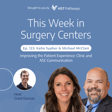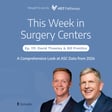
Dr. Kenjarski - Optimizing Case Scheduling for All Stakeholders
Dr. Tom Kenjarski is the Founder & Managing Partner of Noble Anesthesia Partners, and we are so excited to sit down with him as he is the first anesthesiologist we’ve had on the show! On today's episode, our host Nick Latz is chatting with Dr. Kenjarski about the current state of anesthesiology in the ASC industry and how surgery centers can optimize case scheduling for all stakeholders, which includes your anesthesia partners.
In our news recap, we’ll cover virtual nurses, the demand for anesthesia providers, ASCA’s ASC Administrator Development Program, and of course, end the news segment with a positive story about a nurse who is using her artistic skills to help her peers reduce job-related anxiety.
Articles Mentioned:
Trinity Health examines in-hospital virtual care model
ASCA's ASC Administrator Development Program
Nurse Uses Creativity to Help Peers Reduce Job-Related Anxiety
Brought to you by HST Pathways.



















